|
The love of money, we are assured by the proverb, is the root of all evil. And yet its acquisition has long been the passion of greedy and unprincipled individuals and corporations, whose unrestrained voracity the global economies are now paying the price for. We tend to trace this back to the 1980s, a time when we were encouraged by what became dubbed as Thatcherism to abandon the collective approach of socialism and act purely as individuals, to think only of our personal wants and ambitions and stuff the poor bugger who gets caught in our flotsam. Years later, when this very attitude has brought entire banking institutions to the brink of collapse, it's almost amusing to contemplate that hardened supporters of this thinking have had to call on the very socialist concept of nationalisation to bail them out.
If there's a film that serves as a snapshot of the amoral 80s lunge for quick wealth then its has to be Oliver Stone's Wall Street, though in ways the director perhaps did not intended. Inspired by his father's experiences as a share trader and intended as a direct criticism of the moral bankruptcy that results from rampant avarice, it created a bad guy so vivid and memorable that he became an icon for budding tycoons everywhere. His 'Greed is good' mantra was taken up as a guiding principal of aggressive western capitalism, while filofax-carrying idiots throughout the western world began telling everyone that "lunch is for wimps."
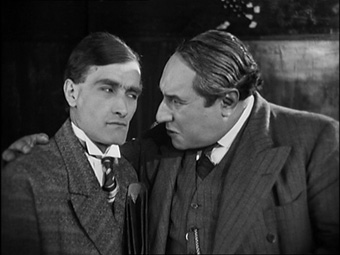
It's in this period, of course, that the image of the venture capitalist as ruthless hard man was created, a ludicrous façade that was wonderfully dissected by fellow reviewer Camus in his coverage of Enron: The Smartest Guys in the Room (click on the title to read it – it's worth it) and one so pervasive that it's become a recognisable and accepted component of our culture. Witness the string of wretchedly awful capitalist reality shows like Dragon's Den, in which a panel of obscenely wealthy, surly-faced arses of both genders get to verbally crap on a string of wannabe suck-ups for our so-called entertainment. Wouldn't you love, just once, to see someone gun the bastards down with a Kalashnikov when they ridiculed his idea? That'd show Alan Sugar what fired really means.
It's easy to forget in the present world situation that the figure of the avaricious share trader goes back well over a century, and that the image of the pot-bellied, cigar-smoking banker was a figure of cartoon satire back in the Victorian era andeven beyond. The American stock market itself can trace its history back a good two hundred years or so, and Emile Zola's novel from which the film under discussion here was adapted was written as a criticism of the French banking systems of 1868, by when the unscrupulous market trader was clearly already an established reality. The significance of Stone's later movie is that it marked a time when just about anyone could move into this world if they were pushy enough, and the two-way traffic it created meant that they were no longer people we read or heard about, but could be found in bars and on trains, barking into their brick-sized mobile phones in a public broadcast of self-importance.
L'Argent, which anyone with even a smattering of French will know translates as 'Money', is in many respects the Wall Street of its day and in some ways foreshadows key aspects of Stone's movie by almost sixty years. Its message is certainly similar, that the unscrupulous pursuit of wealth is a corrupting and morally destructive force, and it has at its centre two opposing monsters of unrestrained capitalism, both of whom employ unscrupulous tactics to influence the market in an attempt to destroy the other. The parallel extends to a climax in which monster #2 (a stone-faced equivalent of Wall Street's Sir Larry Wildman) comes to the aid of the audience sympathy figures in a buying-and-selling ruse to ruin monster #1, who until late in the story has been posing as their ticket to success. Where the two differ straight off is that while Wall Street builds Gordon Gecko up to mythical proportions before actually revealing him, L'Argent doesn't just introduce wealthy bank chairman Nicolas Saccard in the opening scene, it quickly establishes him as the central character, one we get to know and distrust before we even lay eyes on the innocents of the piece, Jacques and Line Hamelin. They prove easy to identify and sympathise with because they're poor, good looking and in love, which of course makes them ripe for corruption. Jacques is an engineer and a flyer who on his last mission crash landed into an area of French Guyana that he believes could be a source of oil, you see, and if he could just get someone to fund a return flight and the equipment for exploration...
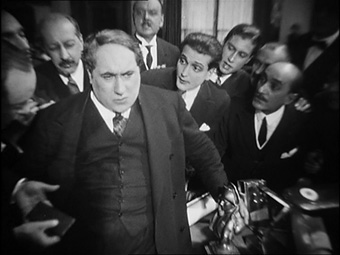
By the time Jacques makes first contact with Saccard, the banker has just lost a tactical battle with bitter rival Gunderman and his company shares are in freefall. An encounter with his enemy in a plush hotel restaurant offers Saccard the opportunity to publicly announce his intention to double the bank's capital, and in no time the staff who had previously been ignoring him are at his feet. By chance Jacques and Line are also there trying to drum up funding from a group of influential investors, one of whom approaches the newly revitalised Saccard with Jacques' proposition. That Saccard's pronouncement is all bluff proves irrelevant – he's caught sight of and been instantly entranced by Line (her legs, especially) and has his eyes on a bigger prize, so agrees to meet with the couple at their apartment. The deal is struck and Jacques prepares for his flight, but Line doesn't want him to go, seemingly convinced that this time he'll meet his doom. Saccard, meanwhile, sets in motion a plan to exploit public interest in the flight and the potential danger to Jacques, in order to re-make his fortune and deal a financial blow to his rival.
In a court case towards the film's end, the prosecuting council suggests that what is really on trial is money itself as much as those who have lusted after it and describes it as "a good servant but a bad master." With the exception of the ideologically driven Jacques, however, almost all within the film are under its consuming spell. Saccard's long-time mistress Baroness Sandorf would probably eat and drink currency if it were digestible, while present at just about every major financial event is the elderly Le Méchain, "an old bird of ill omen," who swoops in to buy shares only when they have hit rock bottom and clean up when they eventually recover. Even Line is seduced, her own desire for wealth fuelled by her poverty and the letters from creditors that she hides from her husband. It's this that leaves her vulnerable to Saccard's approaches – with Jacques away, the banker buys her a luxurious apartment and provides a cheque book for her to spend what she will, which despite some initial reluctance she eventually embraces. Only when he declares his true feelings for her does she realise the financial trap she has fallen into.
It's an intimate tale told on the sort of grand scale that the best big-budget silent cinema did with aplomb but that would involve a hefty CG budget to realise today. The locations in particular, which include the real-life Paris stock exchange building to which L'Herbier had three days of free access, are huge enough to reflect the opulence of the lead characters, with spacious, luxuriously fitted offices and apartments whose ceilings are high enough to need the services of a balloonist to clean and repaint.
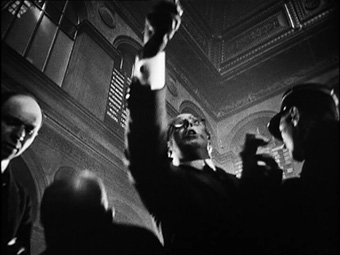
What has assured L'Argent its place in film history has as much to do with its handling as its scale or its plotting and character arcs. L'Herbier's understanding and appreciation of cinema as a medium of visual communication is matched by his willingness to experiment with film technique and form. His telling use of close-ups, character-dwarfing wide shots and sometimes breathless editing are equal to those of Griffiths, Abel Gance or even Murnau, but his sometimes gorgeous use of unusual angels and moving camera is both adventurous and forward-looking. Dolly shots are used to follow or home in on characters, to emphasise emotional responses and even provide visual representation of thoughts and desires. In a sequence of genuine innovation, a combination of hand-held and wheeled transport sees the camera rotate round a character to express a sense of his awe and bemusement at the map-adorned walls of the circular room into which he has been led. Things really go into overdrive in the huge stock exchange building, where the camera swoops over the packed trading floor in a cross-cutting of energy and movement with the launch of Jacques' history-making flight, and spirals skyward to reduce the traders to the size (and by suggestion, character) of ants.
The huge budget gave the producers and director their pick of the available acting talent and the lack of audible dialogue allowed for the casting of performers for their screen presence and status rather than their nationality. Thus while the key roles of Saccard and Lise are played by French actors Pierre Alcover and Marie Glory, Baroness Sandorf and Alphonse Gunderman are played by German actors Brigette Helm – hot property after her role in Fritz Lang's Metropolis – and Alfred Abel, while Pierre is played by Englishman Henry Victor. The performances are all up to the late silent-era standard that saw a reigning in of the exaggerated emotions of earlier films, while given full freedom to run the range is Alcover, who responds by making Saccard a consistently fascinating creature of contempt, fascination and even pity. There's a subtlety to much of his performance that is remarkable for its time – just watch his face when he observes the stock exchange building through metal railings that prefigure the final scene – though his desires on Lise are captured a lot more effectively by the hand that rests on her exposed back than the leery stare that precedes it. Helm creates in Sandorf a woman who can switch from soulless manipulator to steaming seductress in an instant, though Henry Victor's commendable restraint as Jacques does occasionally run the risk of rendering the character a little dull. Possibly most intriguing of all is Alfred Able in the crucial but relatively small role of Gunderman, a coldly calculating creature with a touch of Ernest Thesiger about him who at one point, as his sits calmly stroking his cat with pandemonium unfolding around him, appears to be auditioning for the yet-to-be-written role of Ernst Stavro Blofeld.
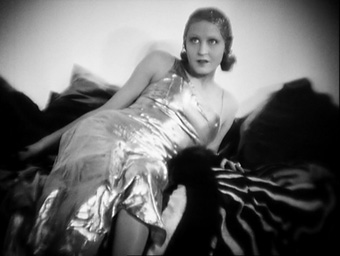
As an example of big budget, late silent era European cinema, L'Argent delivers on all fronts. The characters are well defined and interesting, the story is involvingly structured and effectively updated from Zola's original, and there are aspects to the filmmaking exciting enough to keep cineastes in thrilled discussion for a month. That its message regarding the pursuit of wealth remains as relevant as it ever was is a sad reflection on unchanging times, and clearly fell on deaf ears on its release – less than a year later the activities of the Saccards and Gundermans of the American stock market led ultimately to the Wall Street Crash.
The result of a most impressive restoration by Centre National de la Cinématographie of the director's cut of the film, struck from the original negative, this is one of those transfers that belie the film's age, boasting excellent contrast, tonal range and a sometimes crisp level of detail (L'Herbier's frequent use of soft-edged lens effects can be deceiving here). There's no sign of frame judder and dust and dirt have been very effectively cleaned up. Occasionally there's an increase in grain, but all in all this is a very fine job.
The musical accompaniment to this DVD has been provided by French composer Jean-François Zygel and has been improvised on the piano in the manner of the original silent film accompanists. The opening scene includes the crowd noise supplied by L'Herbier on 78rpm records for screenings at larger cinemas. Both 5.1 surround and stereo 2.0 tracks are on offer, but given that we're just listening to a piano track – a most effective and clearly recorded one it should be said – there's precious little to choose between them.
Introduction by Jean-François Zygel (2:45)
An intro originally recorded for the French Carlotta DVD release in 2000 has the composer and pianist who provides the improvised score on this disc introduce the film and enthusiastically sing its virtues. He also provides some detail on aspects like the casting of small roles that you won't find elsewhere on this release.
The rest of the extra features are on disc 2.
About L'Argent (40:10)
A making-of documentary for a 1928 silent feature? You'd better believe it, and you'll be pushed to find a modern equivalent as interesting and artistically adventurous as this one, the first film of then 20-year-old filmmaking novice Jean Dréville. Providing an welcome glimpse of L'Herbier the director in action, it also details how some of the more complex camera shots were achieved, revelatory footage that sees a camera operator mounted on a wooden platform suspended by cables, or pulled around a room standing on a wheeled tripod. For anyone trying to achieve bolder camera movements on a micro-budget even today, this is inspiring stuff, and for anyone interested it film history it's a goldmine of worthwhile material. First shown back in 1928, a commentary and additional sound effects were added by Dréville in 1971. Some restoration work has apparently been done, but plenty of dust and scratches remain.
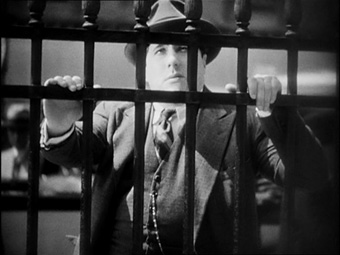
Marcel L'Herbier: Poet of the Silent Art (54:07)
A scholarly look at L'Herbier's career up to L'Argent, which becomes the focus of analysis and appreciation in the second half. There are contributions from a flock of film historians, including those charged with the preservation of his work, and from L'Herbier's daughter and critic and writer Noël Burch, for whom L'Argent is the director's crowning achievement. There's also some archive interview with the man himself, and a few extracts from the above documentary. Critical reactions to the director's work are read out by actor and L'Herbier enthusiast Frédéric Pierrot, who effectively acts as host.
Brigette Helm's Arrival in Paris (1:19)
Pretty much what the title claims, footage of Bridgette Helm being greeted and photographed on a Paris railway platform, shot by Jean Dréville.
L'Argent Screen Tests (17:15)
A compilation of 1928 screen tests for the film, featuring some of the actors, largely in close-up, running through a range of emotions or acting out short sequences. Of real interest to film historians and featuring a few nicely off-guard moments, it's a miracle this has even survived all these years and that it looks as good as it does in places.
Accompanying Silent Cinema (7:18)
A video piece produced for the French Carlotta DVD in which Jean-François Zygel engagingly outlines the process of providing musical accompaniment to silent films.
Sound Demonstration: Stock Exchange Scene (3:34)
When L'Argent was screened in larger cinemas the print was accompanied by two 78rpm records containing sounds of aircraft and crowds to be played during the sequence that cross-cuts between the take-off of Jacques plane and the frenzied activity of the stock exchange. The sequence is run twice, with and without the sound effects.
Booklet
Once again Masters of Cinema have delivered an excellent booklet to accompany the disc, this time containing an extensive and detailed 1990 essay on the film by Richard Abel, an extract from a 1968 Cahiers du cinema interview with L'Herbier, an extract from a 1978 Avante Scène Cinéma interview with L'Herbier, snippets of the critical reaction to the film on its release and a sizeable collection of stills.
If the name of Marcel L'Herbier is new to you then you're unlikely to be alone It's one of the joys of DVD that labels like Masters of Cinema are able to make the work of under-seen filmmakers from years past available to an audience for whom they would otherwise have remained titles in books and magazine articles. L'Herbier's world cinema legacy is considerable, given that he founded the Institut des Hautes Etudes Cinématographiques in 1943, whose students included future filmmakers Louis Malle, Volker Schlöndorff, and Costa-Gavras, but he was also a bold and innovative filmmaker whose work is now held in very high esteem in his home country and deserves to find worldwide appreciation. Eureka's 2-disc release of L'Argent is the perfect introduction, for the film itself and for its fine extra features. Highly recommended.
|